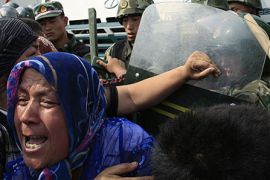
China’s festering ethnic divide
Can Muslim Uighurs and Han Chinese live peacefully after deadly clashes in Xinjiang?
Watch part two
This week, China has seen some of the deadliest clashes since the founding of the People’s Republic and they have exposed the true depth of the animosity between some of its ethnic groups.
On Wednesday, large numbers of security forces blanketed the capital city of China’s Xinjiang region, Urumqi, in an attempt to stop a third day of ethnic violence between Muslim Uighurs and Han Chinese.
But despite the show of force, tensions and tit-for-tat violence have all but paralysed the city.
Rioting broke out on Sunday after what was supposed to be a peaceful march by Uighurs protesting against the killing of two Uighur men last month at a factory in Guangdong province.
The unrest left at least 156 people dead.
Hu Jintao, the Chinese president, cut short his visit to Italy for the G8 summit to deal with the outbreak of ethnic violence.
Uighurs have consistently complained about discrimination and repression under Communist Chinese rule over the past 60 years, accusations the government denies.
The Han are China’s dominant ethnic group, making up almost 92 per cent of the nation’s 1.3 billion people.
Can the two groups live together after the violence of this week?
On Thursday’s Riz Khan we speak to Nury Turkel, an Uighur-American attorney and the co-founder of the Uighur Human Rights Project; also on the programme Walter Lohman, the director of The Heritage Foundation’s Asian Studies Centre.
This episode of the Riz Khan show aired from Thursday, July 09, 2009.